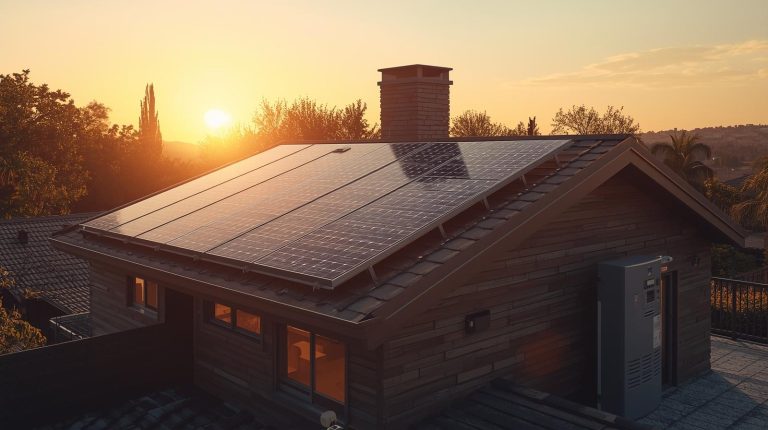Picture this: you’re tired of relying on the grid for your power needs, and you’re ready to take control of your energy consumption. But where do you start?
The world of off-grid solar power systems can be overwhelming, with so many options to choose from. That’s where this discussion comes in. In this article, we will explore the top 9 best off-grid solar power systems in terms of cost and efficiency.
From high efficiency solar panel systems to affordable and efficient solutions, we’ve got you covered.
So, if you’re ready to take the leap into energy independence, keep reading to discover the best off-grid solar power systems that will suit your needs and budget.
Key Takeaways
- Off-grid solar systems offer energy independence and customization, providing reliable power supply during grid outages and reducing reliance on fossil fuels.
- Factors to consider for affordable and efficient off-grid solar systems include accurately assessing energy needs, choosing reliable components, and optimizing system size for optimal energy production and utilization.
- Regular maintenance is essential for the longevity and efficiency of off-grid solar systems, including routine inspections, cleaning solar panels, and monitoring system performance.
- Off-grid solar systems are highly efficient and cost-effective, generating more power in limited space, performing well in low light conditions, and offering long-term cost savings through reduced or eliminated utility bills.
High Efficiency Solar Panel Systems
High efficiency solar panel systems maximize energy production by converting a higher percentage of sunlight into electricity, making them ideal for off-grid systems and smaller rooftops with space constraints.
These high efficiency panels are designed to generate more power in limited space, allowing for increased energy output. This is especially beneficial for off-grid solar power systems where maximizing energy production and space utilization is essential for self-sufficiency.
Additionally, high efficiency panels are capable of better performance even in low light conditions, such as during cloudy or overcast days. While these panels may have a higher initial cost, they can result in greater long-term savings due to their ability to produce more energy over their lifespan.
Cost-Effective Off-Grid Solar Solutions
When it comes to off-grid solar solutions, affordability is key. You want a system that’s budget-friendly and cost-effective, without compromising on the benefits of renewable energy.
Affordable Solar Power
Off-grid solar power systems offer a cost-effective solution for those seeking affordable and sustainable energy independence. When it comes to affordability, residential solar panels are a popular choice. These panels can be easily installed and provide a reliable source of energy.
Additionally, by opting for off-grid systems instead of grid-tied solar systems, you avoid the costs associated with connecting to the grid. Another cost-saving component is the inverter, which converts the DC power generated by the solar panels into AC power for use in your home. Solar charge controllers are also essential in regulating the charging process of the batteries, ensuring their longevity.
The size of your off-grid solar system will depend on your energy consumption needs. By carefully considering the components and system size, you can create an affordable off-grid solar power system that meets your energy requirements.
Budget-Friendly Off-Grid Solutions
By opting for cost-effective off-grid solar solutions, you can achieve energy independence and sustainability while staying within your budget.
Off-grid systems provide the perfect solution for those seeking liberation from the grid and want to reduce their energy consumption. However, it is important to consider the installation costs and system performance when choosing a budget-friendly off-grid solution.
One way to reduce costs is by selecting the right battery storage for your solar energy system. Battery banks are crucial for storing excess energy generated by your solar panels, ensuring you have backup power during cloudy days or at night. Additionally, exploring federal solar incentives can help offset the initial installation costs, making off-grid systems more affordable.
To further emphasize the importance of budget-friendly off-grid solutions, here is a table highlighting the key factors to consider:
| Factors | Description |
|---|---|
| Installation Costs | Consider the upfront expenses for solar panels and components. |
| Grid Connection | Determine if you want to remain disconnected from the grid or have a backup connection. |
| System Performance | Evaluate the efficiency and reliability of the off-grid system. |
Choosing a budget-friendly off-grid solution requires careful consideration of these factors, ensuring that your system meets your energy needs without breaking the bank.
Cost-Effective Renewable Energy
For a cost-effective approach to renewable energy, consider implementing off-grid solar solutions that provide energy independence and sustainability while staying within your budget. Off-grid systems offer numerous benefits, including environmental sustainability, system design flexibility, cost savings, and increased reliability.
Here are three reasons why off-grid solar solutions can be a cost-effective option for meeting your energy needs:
- Lower long-term costs: While off-grid systems may require a larger upfront investment, they eliminate monthly electricity bills and the need for grid connection fees, resulting in significant long-term savings.
- Customizable system components: Off-grid solar systems allow you to tailor the system components, such as solar panels, batteries, charge controllers, and inverters, to match your energy requirements and budget. This flexibility ensures that you only invest in what you truly need.
- Reduced reliance on fossil fuels: By harnessing solar energy, off-grid systems provide a clean and renewable source of electricity, reducing your dependence on non-renewable energy sources and contributing to a more sustainable future.
Top-rated Solar Power Systems
When considering top-rated solar power systems for your off-grid needs, it’s important to compare their efficiency ratings. This will help you determine which system will provide the most energy output for your consumption needs.
Additionally, conducting a cost breakdown analysis will allow you to assess the long-term financial benefits of each system.
Lastly, evaluating the performance of these systems in remote locations is crucial, as it ensures that you’ll have reliable power even in areas with limited access to sunlight.
Efficiency Ratings Comparison
Efficiency ratings play a crucial role in comparing top-rated off-grid solar power systems. When evaluating the efficiency of these systems, there are a few key factors to consider:
- Solar Panels: The efficiency of the solar panels themselves is important. Higher efficiency panels can convert a greater percentage of sunlight into usable electricity, maximizing the system’s overall efficiency.
- Battery: The efficiency of the battery is also significant. A high-quality battery with efficient charging and discharging capabilities ensures minimal energy loss and maximizes the system’s storage capacity.
- Inverter and Charge Controller: The efficiency of the inverter and charge controller is crucial for converting and managing the electricity generated by the solar panels. Higher efficiency in these components reduces energy loss during the conversion process.
Cost Breakdown Analysis
The cost breakdown analysis of top-rated solar power systems reveals the various components and factors that contribute to the overall expense.
Off-grid systems typically cost between $45,000 and $65,000, depending on the size of the system, the type of components used, and the specific configuration. There are different types of off-grid systems, including DC, mixed DC and AC, AC with wind, and AC solar systems, each with their own price points.
The main components of an off-grid solar system include solar panels, an off-grid inverter, solar charge controllers, a battery bank, and an optional backup generator. The choice of battery, such as lead-acid or lithium-ion, also affects the cost.
Other factors that influence the cost of an off-grid solar system include home energy consumption, local sunshine conditions, and the need to account for worst-case scenarios.
Performance in Remote Locations
Off-grid solar power systems excel in providing reliable and sustainable energy solutions in remote locations. When it comes to performance in remote areas, these systems offer several advantages.
- Energy Independence: Off-grid systems allow you to break free from utility companies and have complete control over your energy production and usage. This is especially beneficial in remote locations where accessing traditional power sources may be challenging.
- Customization: With off-grid systems, you have the freedom to choose the solar components, brands, and alternate energy sources that best suit your needs. This flexibility ensures that your system is tailored to maximize efficiency.
- Backup Power: Off-grid systems use solar batteries to store excess energy, ensuring a continuous power supply even during cloudy days or when energy demand exceeds production. Additionally, you can choose to incorporate a backup generator for extra reliability.
Reliable Off-Grid Solar Systems
During grid outages, reliable off-grid solar systems provide an uninterrupted power supply, ensuring that you can generate enough power to meet your home’s electricity needs.
These systems typically consist of solar panels and batteries, allowing you to store excess energy during the day and use it when the sun isn’t shining.
One popular option for off-grid solar systems is the Tesla Powerwall, which can store a significant amount of energy and provide backup power during blackouts.
By investing in the best solar system for your needs, you can avoid high energy costs and reduce your reliance on the grid as a backup.
With a reliable off-grid solar system, you can power your home even when the grid fails, giving you the freedom and peace of mind to enjoy uninterrupted electricity.
Affordable and Efficient Solar Systems
When considering reliable off-grid solar systems, it’s important to explore affordable and efficient options that can meet your energy needs while minimizing costs. Here are three key factors to consider:
- Generate DC power: Off-grid systems rely on solar panels to generate DC power, which is then converted to AC power for use in your home. It’s essential to choose high-quality solar panels that can efficiently convert sunlight into electricity.
- Enough panels: To run your off-grid system effectively, you need enough solar panels to generate sufficient power. Calculating your energy consumption and considering your location’s solar exposure will help determine the number of panels required.
- Cost data: Research the average cost of solar panels and related components to find affordable options that fit your budget. Consider the long-term savings and potential incentives when evaluating the overall cost-effectiveness of different systems.
Additionally, explore the various types of charge controllers available to regulate the power flow from the solar panels to the battery bank, ensuring efficient charging and maximizing battery life.
Best Value Off-Grid Solar Solutions
For those seeking the best value in off-grid solar solutions, it is crucial to consider a combination of affordability, efficiency, and reliability.
When considering the best value, it’s important to assess your needs and priorities. Factors such as the size of your property, power requirements, and location can influence your decision.
Additionally, exploring tax credits, researching reputable solar companies, and considering battery options, charge controllers, and inverters can further enhance the value of your off-grid solar system.
Remember, with careful planning and consideration, you can find the best off-grid solar solution that meets both your budget and energy needs.
Cutting-Edge Solar Power Systems
To explore the latest advancements in off-grid solar power systems, we’ll now dive into the world of cutting-edge solar solutions. These cutting-edge systems offer innovative features and technologies that maximize efficiency and energy production.
Here are three key features of cutting-edge solar power systems:
- Maximum Power Point Tracking (MPPT): MPPT technology allows the solar panels to optimize their energy output by finding the maximum power point for converting sunlight into electricity. This ensures that you get the most energy from your panels, even in less-than-ideal conditions.
- LFP Battery Storage: Lithium Iron Phosphate (LFP) batteries are becoming increasingly popular for off-grid solar systems. These batteries offer high energy density, longer lifespan, and better performance compared to traditional lead-acid batteries. With LFP batteries, you can store more energy and rely solely on solar power for longer periods.
- Advanced Inverters: Off-grid solar systems require an inverter to convert DC power from the solar panels into AC power for your home. Cutting-edge inverters are designed to be more efficient and reliable, ensuring that you can run your home smoothly and efficiently on solar power.
As with any solar investment, costs vary depending on the size and complexity of the system. However, with the advancements in technology, installing your system has become easier and more cost-effective, making off-grid solar power a viable option for many individuals and communities.
Whether you live in New Mexico or any other location, cutting-edge solar power systems provide the opportunity to harness and store energy from the sun, offering liberation from traditional grid power and a more sustainable future.
Efficient Off-Grid Solar Energy Systems
Efficient off-grid solar energy systems maximize energy production and provide reliable power, offering a sustainable and cost-effective solution for those seeking energy independence.
These systems are ideal for homes experiencing frequent power outages and for individuals who want to reduce their reliance on fossil fuels and lower harmful emissions.
By incorporating solar components and alternate energy sources, off-grid systems offer customizable design options to meet specific energy needs. They not only lead to cost savings but also increase energy awareness and provide peace of mind during emergencies.
Optimal Cost-Efficiency Solar Systems
Optimal cost-efficiency solar systems maximize energy production and offer a sustainable solution for achieving energy independence. To help you make an informed decision, here are three key factors to consider when choosing an off-grid solar system:
System Size:
The size of your off-grid solar panel system will depend on your daily average consumption and the amount of electricity you need. By accurately assessing your energy needs, you can ensure that the system you choose is appropriately sized to meet your requirements.
Components:
A well-designed off-grid solar system requires reliable components such as solar panels, inverters, charge controllers, and batteries. These components work together to capture, convert, and store solar energy. It’s essential to select high-quality components to ensure optimal performance and longevity.
Location Considerations:
The location of your home plays a crucial role in determining the effectiveness of your off-grid solar system. Factors such as solar exposure and climate conditions, like those found in New Mexico, impact the system’s production levels. Understanding these factors will help you optimize your solar system’s performance.
Frequently Asked Questions
What Is the Most Efficient Off-Grid Power Source?
The most efficient off-grid power source is subjective and depends on various factors such as location and energy needs. Options to consider include wind energy, hydro power, biomass energy, geothermal power, fuel cells, micro hydro systems, solar thermal, tidal energy, portable generators, and biofuels.
How Much Does a Complete Off-Grid Solar System Cost?
A complete off-grid solar system can cost anywhere from $45,000 to $65,000. Factors such as home energy consumption and local sunshine conditions can affect the cost. However, investing in an off-grid system can lead to long-term savings and environmental benefits.
What Is the Best Cost Effective Solar System?
Looking for the best cost-effective solar system? Consider affordable options for DIY installation. These systems work well in remote locations and are portable for small scale applications. They require minimal maintenance and provide backup power using renewable energy sources. Explore off-grid financing and energy storage options.
What Is the Best Off-Grid Solar System?
The best off-grid solar system for you depends on your specific needs and preferences. Consider top-rated panels, advantages of off-grid systems, choosing the right battery, key components, installation tips, and maintenance for a reliable and efficient off-grid setup.
Conclusion
After exploring the benefits, costs, and components of off-grid solar power systems, it’s clear that these systems offer a compelling solution for achieving energy independence and environmental sustainability.
With their flexible design options and the availability of efficient batteries and inverters, off-grid systems provide reliable and affordable solar energy solutions.
While there are factors to consider and costs to evaluate, the potential for optimal cost-efficiency makes off-grid solar power systems a valuable choice for those seeking a sustainable and self-sufficient energy solution.




